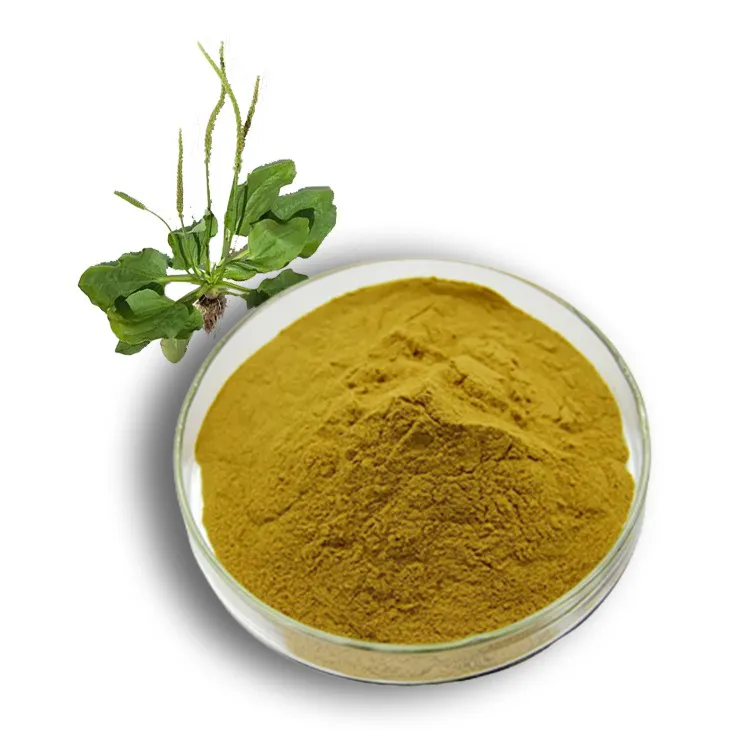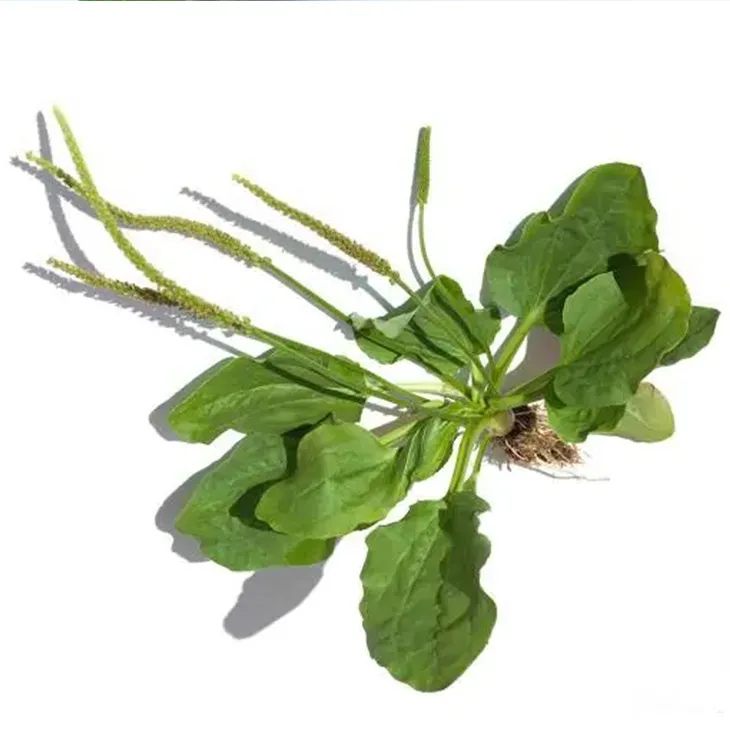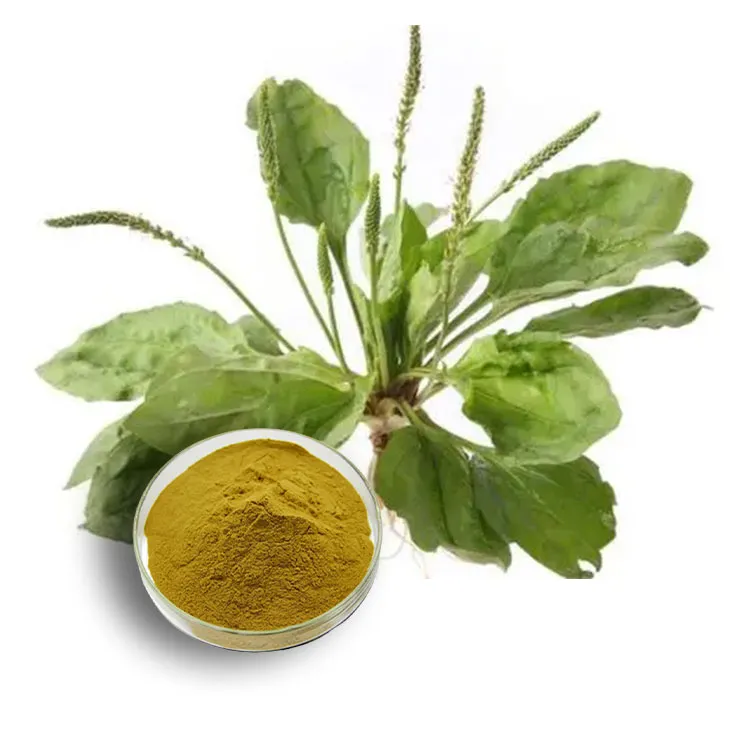- 0086-571-85302990
- sales@greenskybio.com
Best Answers to 7 Key Questions about Plantain Extract.
2024-12-09

1. Origin of Plantain extract
Plantain is a common plant that can be found in many parts of the world. There are two main types of plantains relevant to extract production: broad - leaved plantain (Plantago major) and narrow - leaved plantain (Plantago lanceolata).
These plants are native to Europe and Asia but have been naturalized in other regions, including North America. They typically grow in areas such as meadows, fields, and along roadsides. The long history of plantain use dates back to ancient times when it was recognized for its medicinal properties by various cultures.

2. Benefits of Plantain extract
2.1 Anti - inflammatory Properties
Plantain extract contains compounds such as flavonoids and phenolic acids that have anti - inflammatory effects. This can be beneficial for conditions like arthritis, where inflammation in the joints causes pain and stiffness. In vitro and some animal studies have shown that plantain extract can reduce the production of inflammatory mediators.
2.2 Wound Healing
The extract has been traditionally used for wound healing. It promotes the formation of new tissue by stimulating cell proliferation. Additionally, it has antimicrobial properties that can prevent wound infections. Studies have demonstrated that applying plantain extract topically can accelerate the healing process of minor cuts and abrasions.
2.3 Digestive Health
Plantain extract may support digestive health. It can help soothe irritated digestive tracts. Some of its components have mucilaginous properties, which can form a protective layer on the lining of the intestines. This can be useful for individuals with conditions like gastritis or irritable bowel syndrome.

3. Uses of Plantain Extract
3.1 In Cosmetics
- Skin Care: Plantain extract is used in skin care products due to its anti - inflammatory and moisturizing properties. It can be found in creams, lotions, and serums, especially those designed for sensitive or irritated skin.
- Hair Care: In hair products, it can help to soothe an itchy scalp and promote healthy hair growth. It may be included in shampoos and conditioners.
3.2 In Herbal Medicine
- Internal Use: As a herbal remedy, it can be consumed in the form of teas or tinctures to address digestive issues or as a general tonic. However, it should be used under the guidance of a healthcare professional.
- External Use: For treating skin problems like eczema, psoriasis, or minor burns, plantain extract can be applied topically as a poultice or in the form of ointments.

4. Side Effects of Plantain Extract
While plantain extract is generally considered safe for most people, there are some potential side effects to be aware of.
4.1 Allergic Reactions
Some individuals may be allergic to plantain. Symptoms of an allergic reaction can include skin rashes, itching, swelling, or difficulty breathing. People with known allergies to other plants in the Plantaginaceae family may be at a higher risk.
4.2 Gastrointestinal Disturbances
In rare cases, when consumed in large amounts, plantain extract may cause gastrointestinal problems such as nausea, vomiting, or diarrhea. This is more likely to occur if the extract is of poor quality or if it has been contaminated.
5. Extraction Methods of Plantain Extract
5.1 Solvent Extraction
- One common method is solvent extraction. Organic solvents such as ethanol or methanol are often used. The plantain leaves or other parts are soaked in the solvent for a period of time. The solvent then dissolves the active compounds in the plantain, and after filtration and evaporation of the solvent, the plantain extract is obtained. This method is relatively efficient in extracting a wide range of compounds.
5.2 Maceration
- Maceration involves soaking the plantain material in a liquid (usually water or a water - based solution) for an extended period, often several days. The active components gradually leach into the liquid. After that, the liquid is separated from the solid plant material, and it can be further processed, such as by evaporation to concentrate the extract.
5.3 Supercritical Fluid Extraction
- Supercritical fluid extraction uses supercritical carbon dioxide as the extraction medium. This method has the advantage of being more environmentally friendly compared to solvent extraction with organic solvents. It can also produce a purer extract with better preservation of the active compounds' properties. However, it requires specialized equipment and is more costly.
6. Interactions of Plantain Extract
6.1 With Medications
- If you are taking blood - thinning medications, plantain extract may interact with them. Some components in the extract may have a mild anticoagulant effect, which could potentially increase the risk of bleeding when combined with anticoagulant drugs.
- For individuals taking medications for diabetes, there may be interactions as well. Plantain extract could potentially affect blood sugar levels, so it is important to monitor blood sugar closely if using the extract while on diabetes medications.
6.2 With Other Herbs
- When combined with other herbs that have similar effects, such as anti - inflammatory herbs, there may be an additive effect. However, this also means that the combined use may increase the risk of side effects if not properly dosed. For example, if combined with ginger, which also has anti - inflammatory properties, the overall anti - inflammatory effect may be enhanced, but the risk of gastrointestinal side effects may also increase.
7. Future Prospects of Plantain Extract
7.1 Research and Development
- There is ongoing research into the potential new benefits of plantain extract. Scientists are exploring its use in treating more complex diseases, such as autoimmune disorders. With further research, it may be possible to develop more targeted and effective plantain - based therapies.
7.2 Industrial Applications
- In the cosmetics industry, the demand for natural and effective ingredients like plantain extract is expected to grow. Manufacturers are likely to develop more innovative products incorporating plantain extract. In the food and beverage industry, plantain extract could potentially be used as a functional ingredient, for example, in products promoting digestive health.
7.3 Sustainability
- As the awareness of sustainability grows, plantain, which is relatively easy to cultivate and has a wide distribution, may become an important source of natural extract. Efforts may be made to develop more sustainable cultivation and extraction methods to meet the increasing demand.
FAQ:
1. What is the origin of plantain extract?
Plantain extract is derived from the plantain plant. There are different species of plantains, such as Plantago major and Plantago lanceolata. These plants are widespread across various regions of the world, including Europe, Asia, and North America. They typically grow in meadows, along roadsides, and in other open areas. The extraction process involves harvesting the plantain plants and then using various methods to obtain the extract, which can contain a variety of bioactive compounds.
2. What are the main benefits of plantain extract?
Plantain extract offers several benefits. It has anti - inflammatory properties, which can be helpful in reducing inflammation in the body, for example, in cases of skin inflammation or minor internal inflammations. It also has antioxidant properties, which can combat free radicals and protect cells from oxidative damage. Additionally, it may have antimicrobial effects, potentially helping to fight against certain bacteria, fungi, and viruses. Some studies suggest that it can also be beneficial for digestive health, as it may help soothe the digestive tract.
3. How can plantain extract be used?
Plantain extract can be used in multiple ways. In skincare, it can be applied topically in the form of creams, ointments, or gels to treat skin conditions like eczema, psoriasis, and minor cuts or burns. For internal use, it may be available in the form of capsules or tinctures. Some people also use it in herbal teas, which can potentially provide digestive and other health benefits. In addition, it can be used in natural cosmetics as an ingredient for its various beneficial properties.
4. Are there any side effects of plantain extract?
While plantain extract is generally considered safe for most people, some potential side effects may occur. In some cases, topical application may cause skin irritation, especially in individuals with very sensitive skin. If taken internally in large amounts, it may cause digestive discomfort, such as nausea or diarrhea. However, these side effects are relatively rare, and most people tolerate plantain extract well when used appropriately.
5. What are the common extraction methods of plantain extract?
There are several common extraction methods for plantain extract. One method is solvent extraction, where solvents such as ethanol or water are used to extract the active compounds from the plantain plant material. Another method is steam distillation, which is mainly used to obtain essential oils from plantain if applicable. Maceration, which involves soaking the plant material in a solvent for a period of time, is also a frequently used method. These extraction methods aim to isolate and concentrate the bioactive components present in the plantain.
6. Does plantain extract interact with other substances?
There is limited research on the interactions of plantain extract with other substances. However, it is possible that it could interact with certain medications. For example, if someone is taking medications for blood clotting, plantain extract, due to its potential effects on the body, might interact with these medications. It is always advisable for individuals taking medications to consult a healthcare provider before using plantain extract to avoid any potential adverse interactions.
7. What are the future prospects of plantain extract?
The future prospects of plantain extract are quite promising. As the demand for natural and herbal remedies increases, plantain extract is likely to gain more attention. Research is ongoing to further explore its potential health benefits and to develop new applications. For example, in the pharmaceutical industry, there may be potential for the development of new drugs based on the bioactive compounds found in plantain extract. In the cosmetics industry, it could be used in more innovative products as consumers show a growing preference for natural ingredients.
Related literature
- The Bioactive Compounds of Plantain (Plantago spp.) and Their Potential Health Benefits"
- "Extraction and Characterization of Plantain Extract for Therapeutic Applications"
- "Plantain Extract in Skincare: Current Research and Future Trends"
- ▶ Hesperidin
- ▶ citrus bioflavonoids
- ▶ plant extract
- ▶ lycopene
- ▶ Diosmin
- ▶ Grape seed extract
- ▶ Sea buckthorn Juice Powder
- ▶ Beetroot powder
- ▶ Hops Extract
- ▶ Artichoke Extract
- ▶ Reishi mushroom extract
- ▶ Astaxanthin
- ▶ Green Tea Extract
- ▶ Curcumin Extract
- ▶ Horse Chestnut Extract
- ▶ Other Problems
- ▶ Boswellia Serrata Extract
- ▶ Resveratrol Extract
- ▶ Marigold Extract
- ▶ Grape Leaf Extract
- ▶ blog3
- ▶ blog4
- ▶ blog5
-
Pure 85% Tomentil Extract.
2024-12-09
-
Coix Seed Extract
2024-12-09
-
Coconut Water Powder
2024-12-09
-
Acai Berry Extract
2024-12-09
-
Cocoa Extract
2024-12-09
-
Almond Extract Powder
2024-12-09
-
Marigold Extract
2024-12-09
-
Konjac Powder
2024-12-09
-
Yellow Pine Extract
2024-12-09
-
Lycopene
2024-12-09
-
Nettle leaf extract
2024-12-09





















